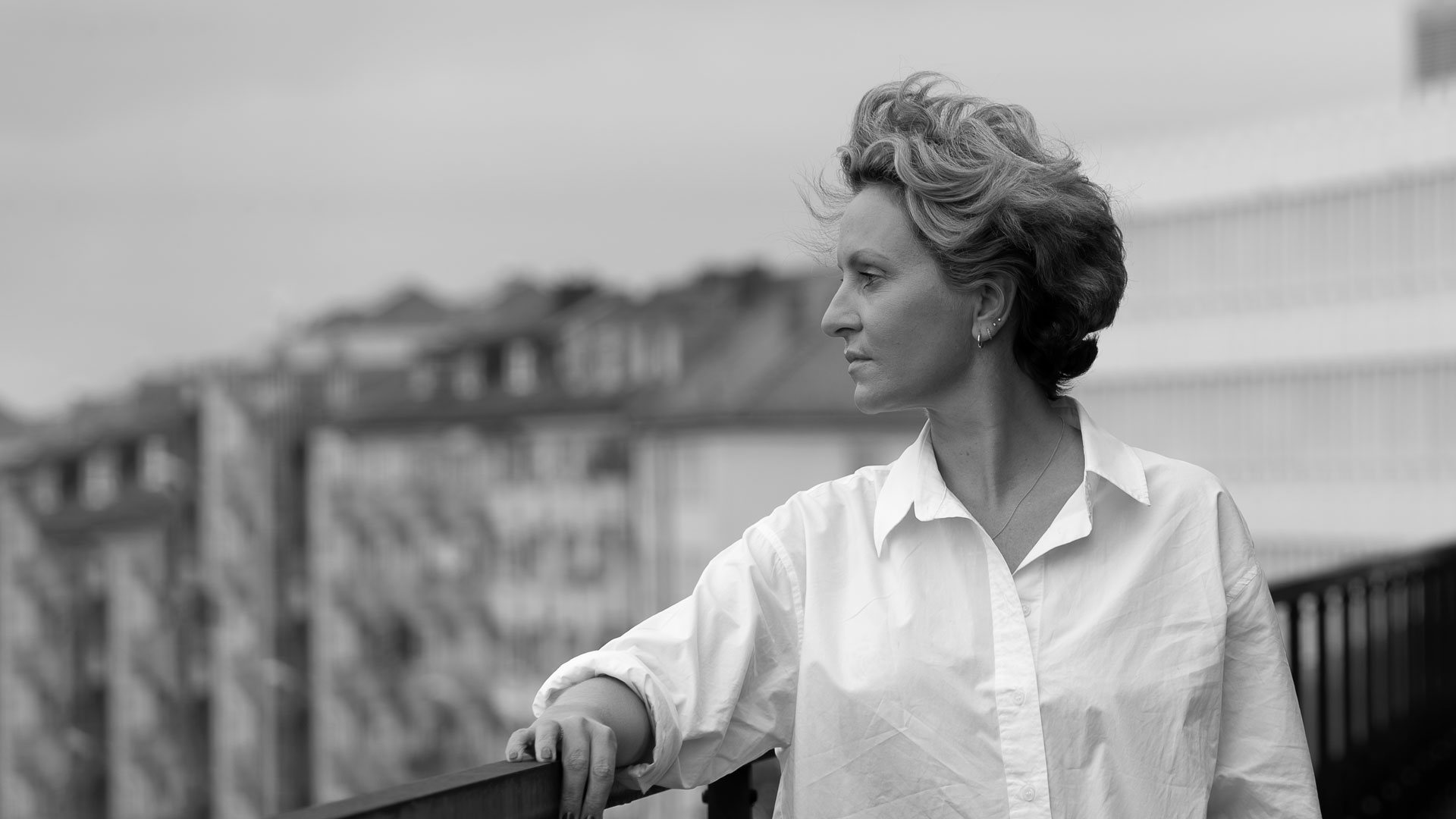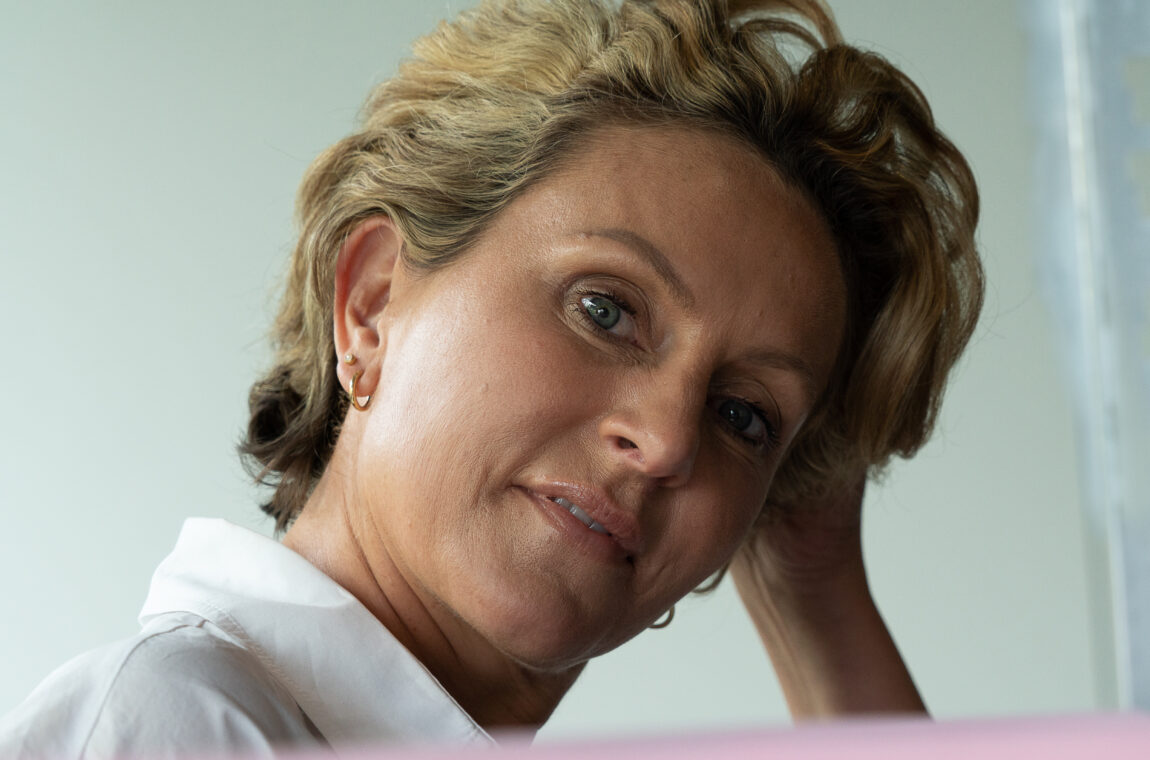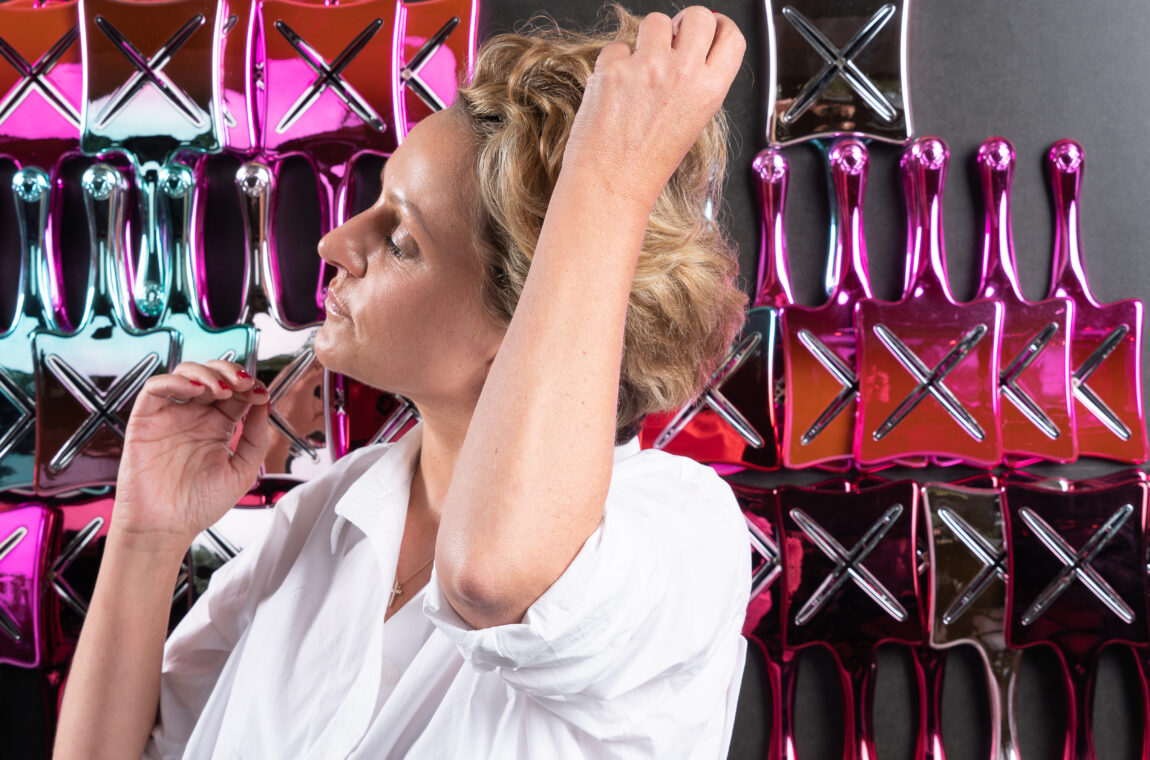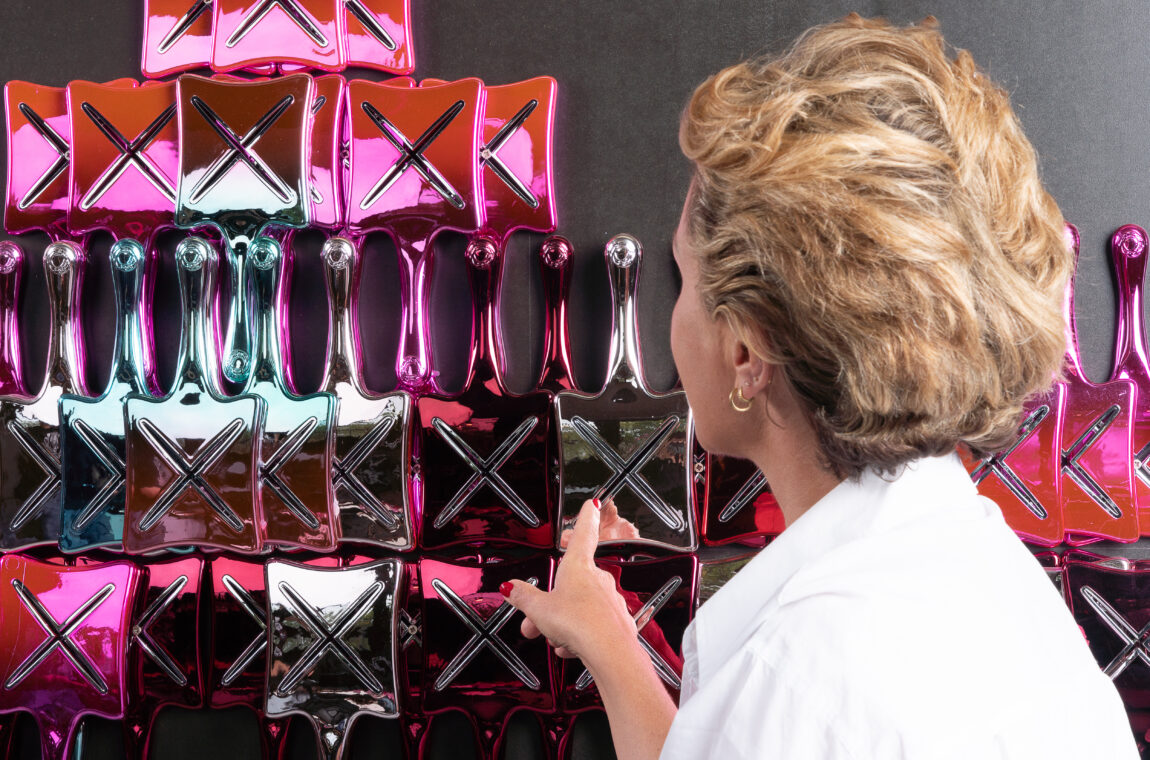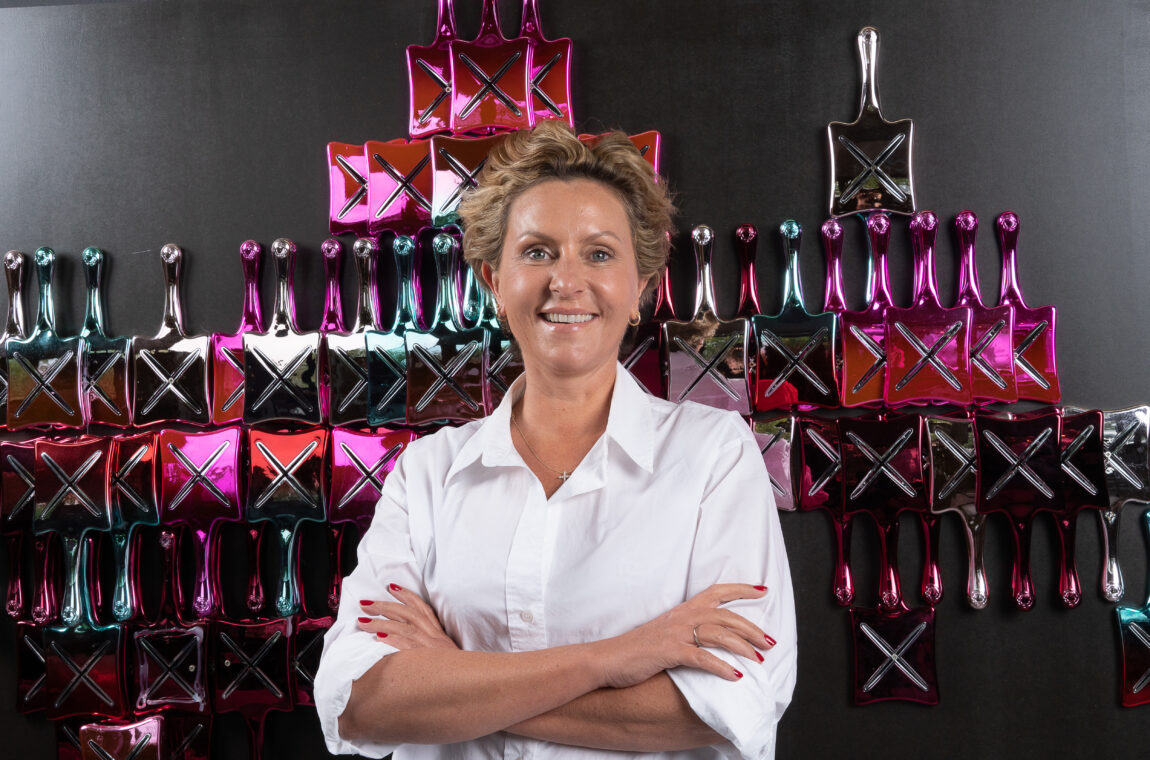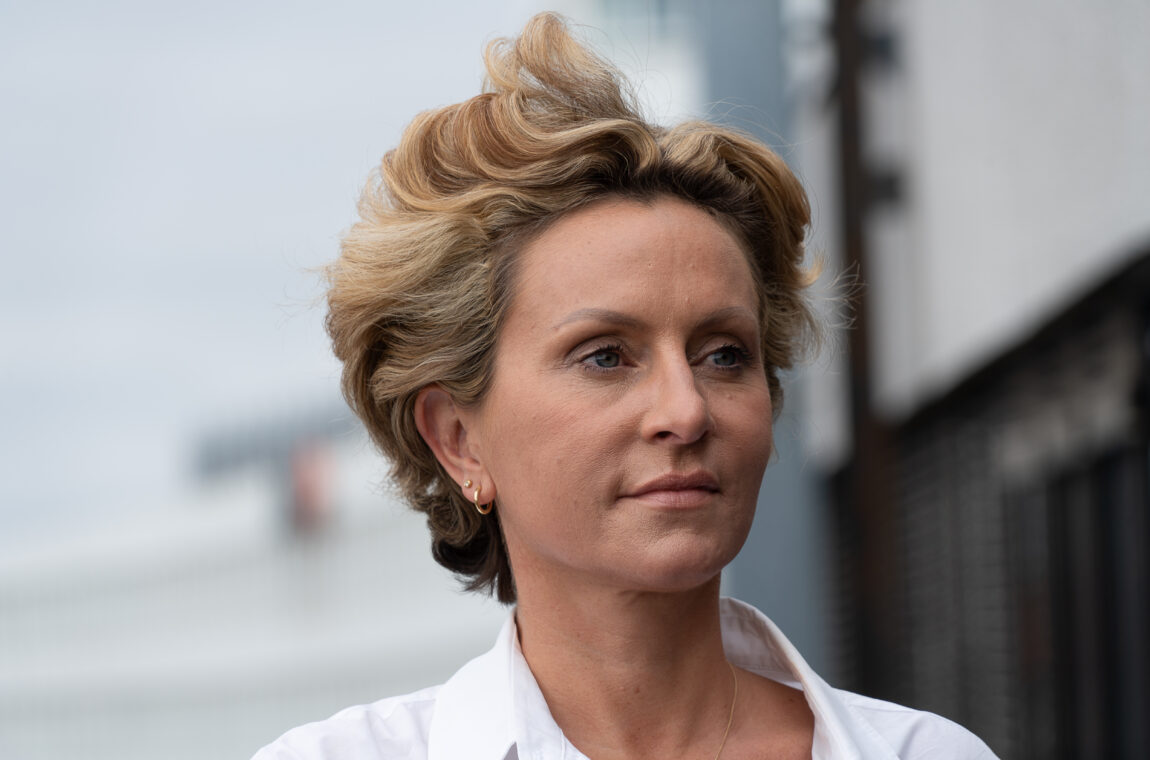Katrin von Hallwyl
Katrin von Hallwyl was born and raised in Germany. She studied hotel management and in 2011 she founded her first online shop ShaveLab.
In 2014 she expanded, adding another company called BeautyLab and creating the brand ikoohair. With the focus on innovation, quality and design, she produces top quality products which are vegan and PETA approved. The packaging is made of recycled cans and is recyclable. ikoo is a company that is very much in tune with contemporary issues and with a growth rate of 675% within three years, one of the fastest growing companies in Germany.

Why do you think are you so successful?
I think to become successful you have to have empathy and be good with people. If you can’t do that, then it’s impossible to be successful in my area of work. I’m in a people business. I’m not someone in research or science. That’s why you have to be able to win people over and motivate them and understand them. There is no other way.
Nowadays, financial motivation is only one part of the job. Today people are looking for other motivations. Of course, money is elementary, because you have to pay your rent and your living expenses. But that is no longer the main motivation for young people. I’m a fan, not necessarily of hierarchy, but of certain management levels so that people have guiding principles to follow. I believe that completely flat hierarchies are not suitable for everyone, especially when you employ young people who have just come out of university and get their first job. They simply have to have someone to refer to someone they can talk to every day and say, “Hi, I’m not getting anywhere. Help me, please!” I think it’s very important to set certain anchor points within departments. I’ve learned that people don’t like flat hierarchies very much. There has always been the need for teams or departments. There was always a patriarchy in companies, or the patriarch-in-chief, but he would never have achieved anything without his troops. People have to be grounded, have a good foundation, and, above all, be able to make use of their experiences and say, “I have learned something from what happened to me.”
You simply need to appreciate how important it is to have a base, and also to be content with the way things are. I think true greatness can arise from there because you also draw a lot of strength from that, because you focus on what’s important. When you are focused, the right and left are simply no longer important. And if you know how to classify what is important and what is not important, then that can bring you a lot further towards peace of mind.
You draw much more strength and much more energy from calmness.
I always find it so interesting when people talk about admired athlets their physical strength and how they play through seasons and what their training is, about their diets and so on. But when you talk to actual professional athletes, they always say they’re not just working on their physical strength, but rather their mental strength. “What am I doing? How present am I? How do I relax? How do I meditate?” My stable level of performance depends 50 percent as much on my mental strength as it does on my physical strength, because one doesn’t exist without the other.In my own diagnosis and in my therapy as well, I noticed that the mind and the body are directly connected so I looked for a therapist from the beginning to coach me. I can’t do it alone and I also can’t do it with my friends or my family. I need someone who will tell me, “I know about this. You need to do things this way or that way, so that you can see a way out of this therapy.” Otherwise, it doesn’t work.
I sometimes looked at things far too emotionally. For example, I was very good at my job in my eyes and then totally bad as a manager. I was not unfair, but I made the wrong decisions because I made the decision too quickly and was too impatient. In the end I said to myself that I had to have someone who is more senior, who is older, who can advise me. That’s also a very big point that I’ve learned as I’ve gotten older: you don’t have to be able to do everything by yourself. You don’t always have to assume from the outset that you can do everything by yourself. That helped me enormously in my therapy. I said I was ready to do this therapy. I’m willing to do it with all the strength I have. So, I consistently do the things my doctor tells me to do. I have to get help because I can’t do it on my own. And that’s something that has given me an incredible amount of peace. I knew I was going to my acupuncture on Monday, to see my psychotherapist on Wednesday and then my socio psychologist, who helped me gain balance with all that.
I think that’s the same as in professional life when you are in a crisis. You don’t have to be able to do everything yourself. You can also get advice. Women in leadership positions always tend to think that they have to stand their ground twice as hard or to be twice as strong. You really don’t have to. I learned to take a step back and to breathe deeply and to ask for advice or to say I can’t make the decision today. I’ll make the decision tomorrow and think about it. Also, to approach things with achievable goals, not with unrealistic ones. That has brought me further a great deal, both professionally and in therapy.
I’m actually appalled that in the phase when you start therapy, you are very strongly conditioned to keep your oncology appointments, that you keep this chemo rhythm on time, that you do this and that, everything that the oncologist advises you to do in his oncology therapy. But nobody thinks about the fact that you should do psycho-oncological therapy at the same time as this therapy. There is no therapy plan that provides for this. It doesn’t exist. It doesn’t exist in Switzerland, it doesn’t exist in Austria, it doesn’t exist in Germany, it simply doesn’t exist. I’m in a privileged situation, because I’m well insured. I’ll go and find somebody. But what about a mother with three children, who is already in a totally devastating situation, saying: “I’m no longer able to work properly after chemo and to really get myself together”, because she doesn’t feel well, because she has to lie in bed for 24 hours feeling as if she has been hit on the head with a hammer. You have to give that woman psychological support to explain, “You didn’t make a mistake by getting this.” That’s what a lot of women have, that stigma. Many women think this has happened because she did something wrong. I experienced this quite often. Women, especially those from certain cultures, often feel first and foremost guilty that they let the family down.They need someone to coach them through it, to help them, to say: “It’s all about you now. It’s not about the children. The children need a mother long term. Now it’s all about you. You’ve got to think about yourself now. Your mental strength and your mental health is a big part of making therapy successful.”
But that’s not what happens, which I think is a huge mistake. It almost makes me angry. I am raised to be polite. But then when I get to a certain point that something makes me feel so powerless, I always get angry. That’s my human weakness.
You have to work on your mental conditioning. And you achieve that, in my opinion, with anchor points. Telling yourself, “I do more sports” or “I eat healthily” or “I walk more in the forest”. is not the end of it. Because it’s also a trauma for your family. It lives with you. For me now, the disease is no longer negative. For me, absurdly, it actually offers something positive to me in the sense that I can see how things developed, how the experience actually was for me. Of course it was a very great burden. Chemotherapy is certainly one of the hardest forms of therapy that you can experience, because it also changes you so much psychologically and puts such a strain on you psychologically. But in the end, now it makes total sense to me because I have the opportunity to help so many others. I can help create awareness. Perhaps I can even help save people’s lives. You might go home today and say, “Gee, I haven’t actually been to a screening in a long time. I’m going to go again.” Then maybe I’ve helped you. And that’s what I’m actually after, which is that very little nudge to say, “Oh, I’d actually better go to the doctor again sometime. I’m going to go get a mammogram or a pap smear again sometime. I’ll just have myself looked at again.”
I have a strong sense of social responsibility. And for me, following the experience that I had, and how I was allowed to experience it, within the scope of my possibilities, I can pass that on, and I can tell people, “This is not nice, but this is doable. This is why you’re going to see a doctor now, please.” And I can also exert a certain, positive pressure. I say, “You have an obligation to your children. You have to go to the doctor. You need to get looked at.” That’s why for me it’s both my human and social responsibility, but also, of course, for me to get closure. You have to do it out of a certain conviction. I wouldn’t be able to do it if I didn’t do it out of conviction. Without that, I would possibly do it half-heartedly., but I’m a very determined person.
But determination can be annoying. You have to use it in doses because some people might handle it badly. You have your own environment and also professional partners. So, you have to adapt and subordinate yourself in a certain way. That’s where the humbleness comes in again but of course don’t lose sight of your goal.
Do you have a role model?
No, I don’t. But neither am I one myself. I’ve never been a stereotypical. person. I always followed trends, of course. That’s what you always do, sometimes fashion or whatever. But I’ve also always been true to myself, whether that’s wearing straight hair or my natural curls again or with it longer or shorter. I’ve never been someone who wants to keep the same look or who stays stagnant in a single role as a wife or in a single role as an entrepreneur or in a single role as a daughter. I’ve never been that because that just doesn’t inspire me anymore. And that’s probably why I don’t have a role model.
What is the impact of nature on your life?
I was in Portugal for 14 days and helped with the harvest, which was really nice, to be able to get out of the daily routine and the office routine and to do a simple job. It’s more physical and not mental, which did me a lot of good because it’s a kind of mental relaxation. And yet you’re tired in the evening because you’ve done something physical. For me it was like a break for my mind. My dog Anton was with me. I have the impression dogs have an emotionally balancing effect. He comes with me to work and we always say he’s our emotional support dog. He is very sensitive and doesn’t like any loud noise and so we’re all very conditioned to work quietly and not to have any emotional outbursts, because Anton doesn’t like it. Everyone respects that. So we always have a good atmosphere when Anton is here. He also helped me a lot during my therapy as I had to go for walks, outdoors, which had a good effect on me.
What is your utopia?
The fact that I’m so down-to-earth means that I’m not utopian at all. That’s how it is. It almost sounds arrogant, but I’m really satisfied with myself. That is a basic prerequisite for my happy life, that I am actually satisfied with myself. It doesn’t have anything to do with my married life or my family life. I am content. I have found that as a human being I am only lovable to others and also worth living for others if I am content with myself.
Of course, there are two or three wishes where I could say what I wish for the world. Whether that is relevant, I don’t know. I am dissatisfied with many things, of course. To give you an example, I’m often asked as an entrepreneur whether I want to give an interview on topics related to anti-racism, what my attitude is to racism. I always say, I don’t understand it at all. As soon as you start talking about racism, you’re accepting the idea of ‘races. I don’t have to explain that I’m not racist, I’ve never been racist and so I don’t have to explain that I’m anti-racist. With Black Lives Matter, I said, no, actually all lives count. Not just the yellow, black, or white ones. I think the people in our company are a good example. It makes me insanely proud. I think we have 27 different nationalities among our 30 employees. And we have a lot of cultural clashes here. One wears a headscarf and the other wears a low neckline down to the navel. One, from the Balkans, likes to cook short-roasted pork, while another one is Muslim, and the pan is not allowed to come even close to pork. We have such a cultural mingling here, which is actually like the building of the Tower of Babel, because so many different people with their different characters then end up working for one goal and are enthusiastic about the one thing they’re doing here, everything else fades into the background. I think that’s a good example, if you give people a meaningful task where they see a goal together and it’s fun, then nothing else matters.
Whether we’re colored or whatever, it shouldn’t really matter. But at the moment it’s the big discussion. It’s trendy, and a lot of big companies are taking up the cause. They write their equality policies and whatever else on their banner. I see it as hypocritical in a way, because it’s not thought through from beginning to end. it doesn’t have anything to do with equality either, if you lift the lid and take a look at what it looks like behind there. It’s like greenwashing, saying somehow that we are environmentally friendly. But actually, we’re not. That’s why I don’t want to go down to that level, because it’s practiced quite differently here on a daily basis. And if anyone asks me about it, they’re welcome to come in and look at our everyday life, that’s explanation enough.
What advice do you give cancer patients?
Trust yourself. When you feel uncomfortable, just change doctor.
Friends and family are very important, but they cannot be your therapists. I recommend searching for a good onko psychologist, who will accompany you. During therapy you are so occupied with the therapy itself, that you lose yourself. But you shouldn’t deal with that on your own, search for professional help.
Normality is very important. The therapy should not be 100 % of your life. My dog was a great help, he was not interested in my condition, he just wanted to go outside. I never quit working. I got up in the morning, put make up on and worked every day for a couple of hours, from Monday to Friday. Except for a couple of days when the chemotherapy hit me too much.
Many people do not want to talk about cancer, because they think it is a sign of weakness. But the more often and the more openly you talk about it, the less cancer frightens you. You have to keep in mind there are therapies and they are in many cases successful.
